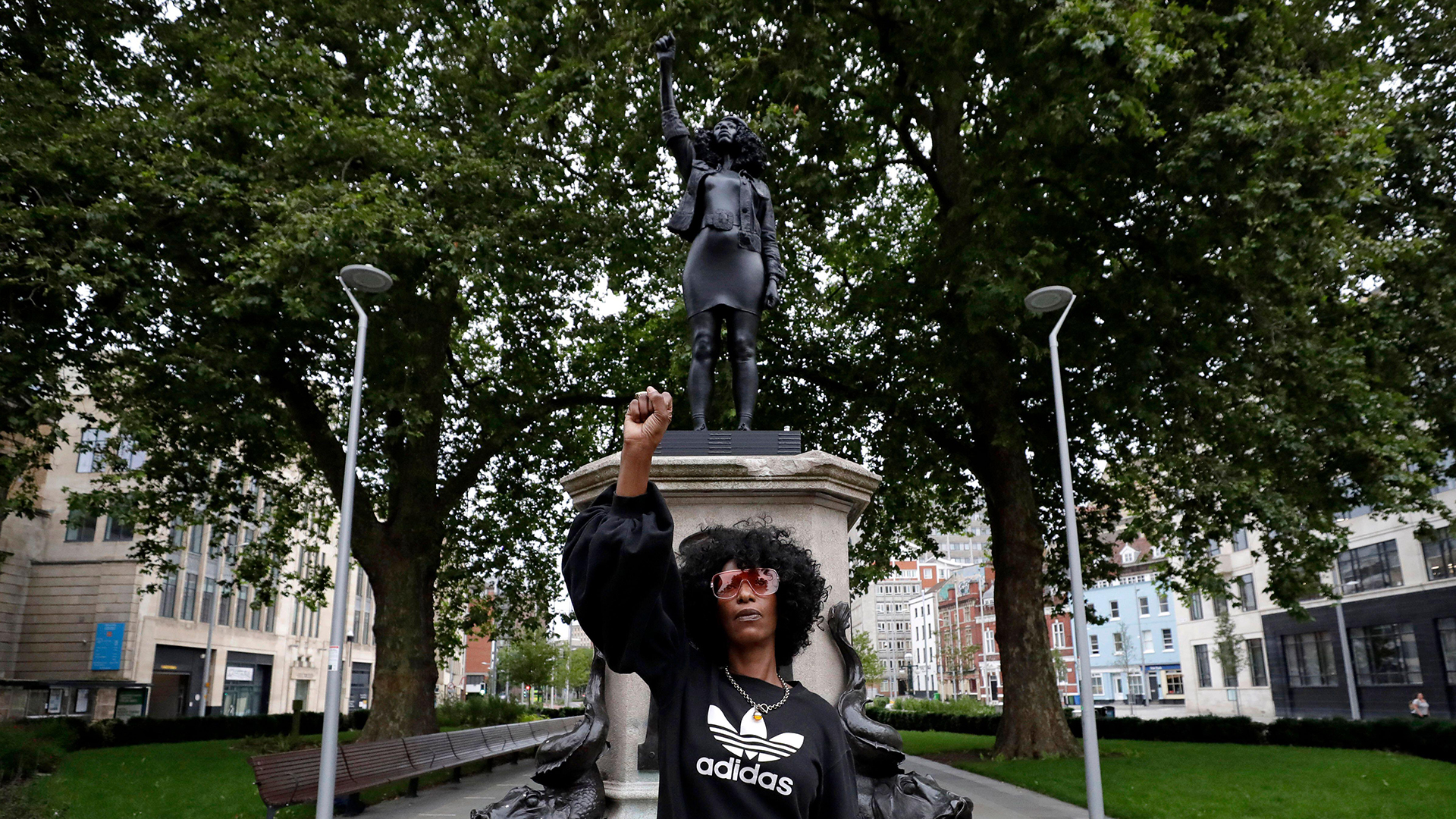How does it feel when people refer to you as hero?
After A Surge of Power was placed on the plinth and removed shortly after (within 24 hours), it took me a few weeks to realise the enormity of what I had done and shied away from the attention. A friend then said to me that I needed to realise what seeing my statue on the plinth meant to them. I then thought how I would feel as a child or teenager growing up and seeing a bold and powerful Black woman with her fist raised and I probably would see her as a hero. So now, I welcome it and feel honoured that some people see me as their hero.
On that day back in 2020, what compelled you to climb up on to the plinth?
Climbing up onto the plinth was a spontaneous act. Having said that, after witnessing the Colston statue being bound with rope, dragged through the streets, and thrown into the harbour the adrenaline coursing through my veins might have been the reason. I unceremoniously landed tummy-first onto the plinth. When I finally stood up and raised my fist and eyes to the sky, I felt so powerful.
What would it have meant to have a book like A Hero Like Me to read while growing up?
It would have meant the world. Representation in books is crucial for children as it validates their identifies, belonging and self-worth. It allows them to see themselves as valuable and
capable individuals.
Advertising helps fund Big Issue’s mission to end poverty
What message do you think children need to know?
Jen Reid: It’s important for them to know that they have the power and the responsibility to shape the future as they are the generation of change. Their voices, ideas and action can bring about meaningful transformation. It’s essential for them to recognise their collective potential and believe in their ability to make a positive impact.
Do children have a better understanding of inequality and unfairness than many adults?
Without a doubt. Adults have more life experience and knowledge, but children’s thought processes are often less clouded by societal norms, biases, or complicated rationales. They see situations more clearly in terms of right and wrong, making them more likely to point out unfairness when they see it.
Since the 2020 protests is there more kindness, peace, courage, or justice?
Since then the impact is varied. While there have been instances of increased empathy and acts of kindness, the overall levels are difficult to gauge. The movement showcased the courage of individuals standing against racial injustice, encouraging others to speak up. While systemic justice is an ongoing process, the BLM [Black Lives Matter] protest raised awareness and initiated discussions on racial inequality and police reform.
Advertising helps fund Big Issue’s mission to end poverty
Are you worried about the Public Order Act 2023 and what it might mean for our right to protest?
I think we should all be worried. The POA 2023 is authoritarian and in breach of our human rights. The police already have the power to manage protests effectively without this act. How are we meant to hold those in power to account if we are unable to take to the streets and protest?
This month sees the 75th anniversary of Windrush, what does that mean to you?
For me and people of West Indian descent the Windrush anniversary symbolises the contributions and struggles of our parents and grandparents who came to the UK seeking better opportunities. They played a major role in helping to rebuild Britain.
What would be the best way to mark the anniversary?
The best way to do this would be by establishing a national holiday, which would symbolise a commitment to social justice and recognition. It would be a step in the right direction to acknowledge the injustices faced by the Windrush generation and their descendants, drawing attention to the need for equality and rectifying past wrongs.
Advertising helps fund Big Issue’s mission to end poverty
A Hero Like Me by Jen Reid with Angela Joy, illustrated by Leire Salaberria, is out now (Frances Lincoln Children’s Books, £7.99)






